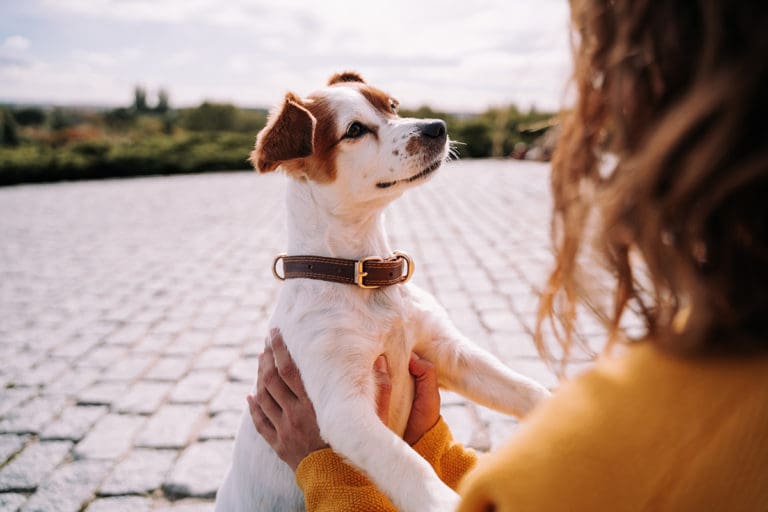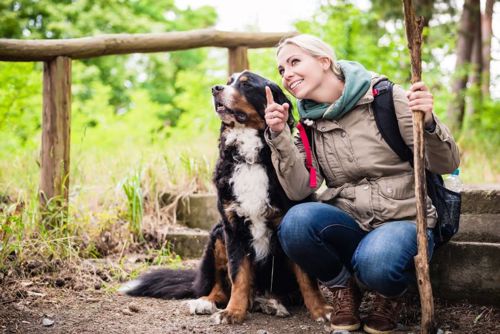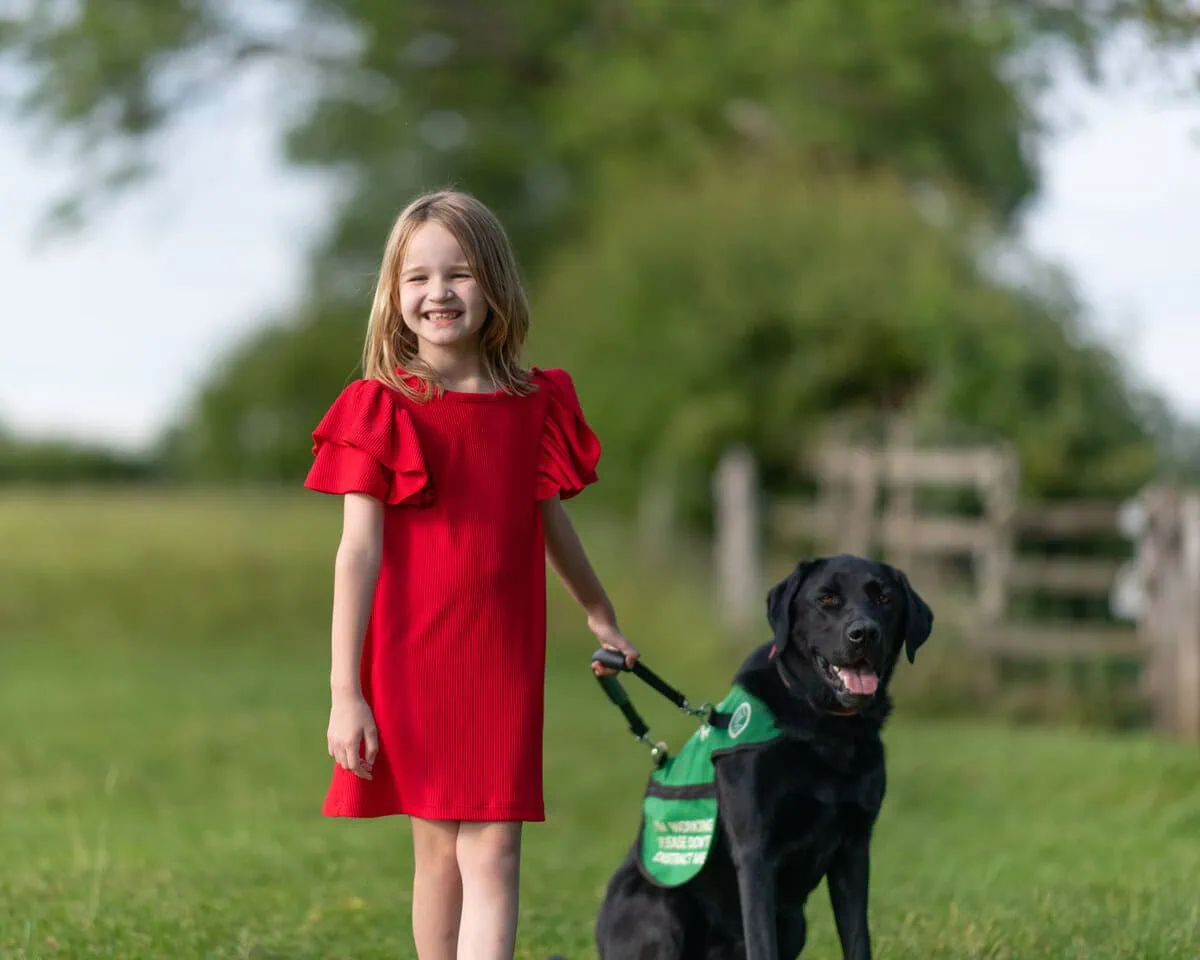
Bonding with your dog takes time, patience and mutual respect. It’s a relationship built through shared experiences, consistency and understanding. And it’s always worth remembering that your dog didn’t choose you; you chose them.
The good news is that there’s plenty you can do to help that bond grow. The tips that follow will help you strengthen your relationship and enjoy life together.
History of the human dog bond
This bond between people and dogs hasn’t always been recognised in the way it is today. In the past, it was common for dogs to live outdoors and be valued mainly for their function, rather than being part of everyday human life. For many people now, that idea feels completely out of step with how we see dogs today.
That said, some working dogs, such as gundogs or sheepdogs, still live outside. As long as their welfare needs are fully met, they can be perfectly content. They usually get plenty of physical exercise and mental stimulation, have strong bonds with their owners, and benefit from having their own quiet, comfortable space to rest without the hustle and bustle of life indoors.
As human lifestyles have changed, so too has the role of dogs within them. The relationship has evolved, and for most families, dogs now live inside the home, with their wellbeing and happiness considered an essential part of the household.
Choosing the right dog for you
When thinking about the kind of dog you’d like in your life, it’s important to choose a breed that fits well with your lifestyle and routine.
Getting this right from the start is a big step towards building a strong and lasting bond. There are plenty of helpful breed search tools available to guide your decision. These can help you find a dog whose typical traits match what you’re able to offer day to day.
For example, a high-energy breed might not be the best match if you can’t commit to regular training, enrichment activities or long daily walks. If your routine includes one longer walk each week and shorter outings the rest of the time, look for a breed that naturally suits that pattern. Choosing the right match gives you both the best chance of enjoying life together.

If you enjoy quiet time and relaxing on the sofa, a greyhound might be the perfect companion. They’re well known for loving a good snooze and are often happiest curled up by your side. In short, it’s all about finding a dog that fits your lifestyle, so you can give them the best life possible.
Dogs are also brilliant teachers. They can bring unexpected richness into our lives through the way they communicate, adapt and connect with us. You might choose to rehome a rescue dog, and while they may have had a difficult start, they often show remarkable strength, resilience and the ability to trust again. There’s a lot we can learn from that.
Get to know your dog
Spending time playing with your dog is a great way to build your bond and learn more about them. Through play, your dog can show you what they enjoy, what they’re not so keen on, how they express happiness and what might cause frustration.
Simple games can be just as rewarding as more challenging ones. It’s all about having fun together and tuning in to what makes your dog tick. You’ll find lots of fun ideas and brain games to try on our website, all designed to help you and your dog enjoy your time together.
Understand dog body language
Dogs are always communicating with us through their body language, facial expressions and behaviour. Taking time to learn what these signals mean can really help you understand how your dog is feeling and what they might need from you.
While some behaviours like barking, whining or stealing food are easy to spot, dogs often give much subtler signs too. These can be just as important and often tell you how relaxed, anxious or excited they are.
Learning to read these clues helps you respond in the right way and builds a stronger, more trusting relationship. Take a look at our guide to understanding dog body language for helpful tips on spotting what your dog is really saying.
Tell them they're a good dog
Your dog will never get tired of hearing your voice. To them, it means you’re connecting and paying attention. They might not understand every word, but your tone, body language and energy tell them a lot about how you’re feeling.
Taking time to improve how you communicate helps build trust and makes it easier for your dog to understand what you need from them too. It’s a two-way conversation — and one that can really strengthen your bond.
Remember strong bonds can't be forced
While building a strong bond with your dog is important, it’s just as important not to force that bond or expect them to do things they’re not comfortable with. For example, some dogs simply don’t enjoy hugs. They may tolerate it, but that doesn’t mean they’re relaxed or happy about it.
At Dogs for Good, we never force our dogs to carry out task work. If a dog doesn’t enjoy the training or the role, we would rather they didn’t continue than go on to be an assistance dog. Just like people in jobs that don’t suit them, those dogs will always be looking for something that feels better.
Every dog deserves the chance to move through life at their own pace, reach their own milestones and enjoy the world in their own way. A strong bond should add richness to their life - not place expectations on them that they haven’t chosen.
How we build a strong human dog bond with our assistance dogs
We believe that the bond between people and dogs is one of the most rewarding relationships you can experience in life.
“The main things that Heather has brought my son, Samuel, are unconditional friendship, love and devotion.”
These words, from the mum of one of our assistance dog partnerships, say so much about the power of this connection. The bond between a person and a dog can be life-changing, for both. At Dogs for Good, we’re proud to witness and support that transformation every day through the work we do.
We believe that if you get it right for dogs, you get it right for people. That’s why we work hard to give every one of our dogs the very best start in life.
Our breeding programme helps us select dogs with the right breed traits to enjoy learning and thrive in a role that supports people with disabilities. They experience a positive and playful puppyhood with help from our amazing volunteer puppy socialisers, growing up with plenty of interaction, varied experiences and gentle encouragement at their own pace. This helps them become confident and relaxed adults.
When they’re ready, our expert trainers guide them with kindness and respect. As they reach the right stage, we begin the careful process of matching each dog to the person they’re best suited to. We consider every detail - temperament, traits, strengths and limitations, to make sure the match is right for both dog and human.
From there, our instructors support both partners to build the kind of bond that makes everyday life possible. It’s a bond that grows stronger over time and lies at the heart of everything we do.
Help support our life-changing work...
Imagine if everyday tasks were so challenging or physically demanding they affected your quality of life. For many people living with a disability or families with a child with autism, that is their reality. Now imagine if a specially trained four-legged friend could restore your, or your family’s, independence.
The demand for our services is high and we can’t help as many people as we would like to without more funding. Please help us continue to bring people and dogs together to help make everyday life possible in so many extraordinary ways.
Every contribution, whatever size, is important and helps us make a difference.
